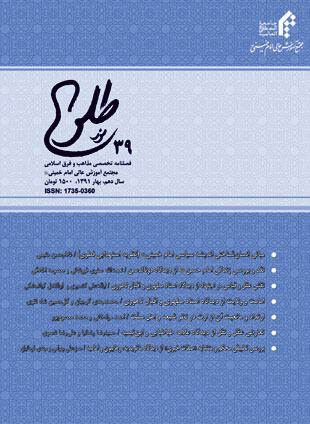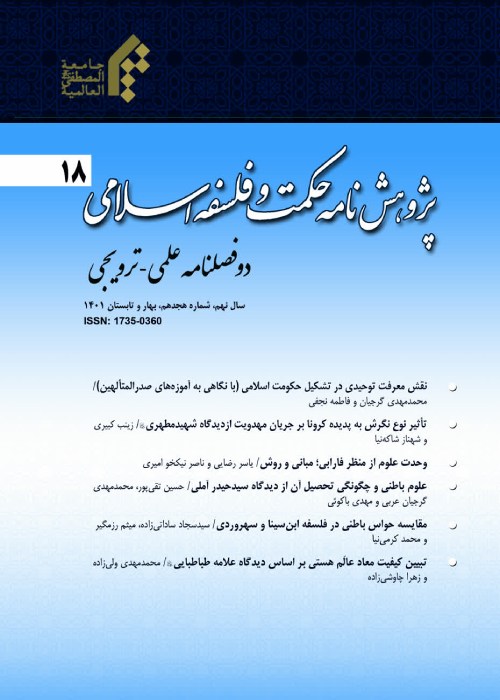فهرست مطالب

پژوهشنامه حکمت و فلسفه اسلامی
سال دهم شماره 39 (بهار 1391)
- 184 صفحه، بهای روی جلد: 15,000ريال
- تاریخ انتشار: 1391/05/25
- تعداد عناوین: 7
-
Page 5This article presupposes that facts (is’s) concerning human nature seriously affects on political “oughts’’ and thoughts. This study is an attempt to explore human nature and character explaining its social and political consequences from Imam Khomeini’s point of view. According to this viewpoint human beings are ‘naturally bound to social life and bestowed with innate orientation’ and the inevitable result of these two (nature of man and his primordial character) is that man is of necessity bound to civilization (of conventional and transcendent sort). Interpretation of human nature as two-dimensional one, as Imam Khomeini understood, has important and deep influences on the form of government, function of political system and Islamic desired society, which is the subject of study in this article.Keywords: political thought, principle of humanology, Imam Khomeini, theory of innate orientation
-
Page 27In the history of Islam there were controversial events in era and career of Imam Hassan. These events have been variously understood from different angles. One of theses interpretations is that of orientalists. Donalson an English orientalist attempts an analysis of Imam Hassan’ life in his Shiite Creed. He attacked Imam Hassan for his numerous marriages and peace with Muawiya, accusin him of having low level of morality, courage, self-control and intellectual capacity. The methodic study of his life shows however that Imam Hassan’s stance towards Muawiya was originally uncompromising and he was compelled to be in peace with Muawiya. Reports on his marriages and frequent divorces are open not only to serious doubts in terms of authenticity and chain of authority but subject to objections in content as well.Keywords: Imam Hassan, Shiite Creed, orientalists, Donaldson, Shia study
-
Page 57Though both Mutahhari and Iqbal Lahori maintain that there is no conflict between reason and revelation, the latter considers analogy (in its two forms) to be an authority and reliable in the domain of fiqh. The closure of the gate of ijtihad, according to both scholars is against the demand od Islamic teachings and interests of Muslims. However, the lack of specialized knowledge in Islamic fiqh, disbelief in the presence of infallible Imam, the lack of faith in totality of Sharia and Divine Law and following Abu Hanifa are among the elements that led Iqbal Lahori to giving legislative role to both sorts of analogy rather than reason and revelation in inferring legal rules, which is refuted firmly with strong arguments by Ayatollah Mutahhari.Keywords: reason, analogy, ijtihad (independent reasoning in practical laws of Islam), revelation, Sharia, totality
-
Page 79According to Martyr Motahhri, Imam holds all the positions of the Prophet except the status of receiving revelation. Motahhari lists such qualities as infallibility, knowledge, higher excellence, courage, justice, morality and similar good character traits for holy Imams. He believes that they are ordained by God. He divides wilayat into positive and negative and each of these two into subdivisions. The positive and constructive wilayat is of love, Imamate, leadership, ontological control over the course of events and Motahhari maintains that the holy Imams enjoy all four types of Wilayat. To him the negative wilayat belongs to Satan and Satanic forces In explaining the necessity of Imamate Allam Iqbal Lahori as one of the great Sunni intellectuals drew on rational argument and held the most important positions and functions of Imamate to be the guidance of Community, unity of the Muslim nations and prevention of society from anarchy. He regards courage, justice, honesty as the most significant qualities of Imams who are to be chosen, in his view, through election. Unlike Motahhri, Iqbal defines the wilayat of Ahl al-Bayt in terms of love and rejects other types of it.Keywords: Imamate, wilayat, caliphate, ordainment, Motahhri, Iqbal Lahori
-
Page 99There is a difference of opinions over the number of elements that prevent one from inheriting or bequeathing between Imami and Sunni doctors of Islamic Law (shari`a) but they unanimously agree on infidelity, murder and slavery as three elements of preventing one from inheritance. apostasy as a sort of infidelity is a hindrance to inheritance. Imami doctors of Law maintain that apostate is deprived of inheritance but he bequeaths and the properties belong to his\ her Muslim heir. Sunni scholars, however, held that apostate neither inherits nor bequeaths.Keywords: inheritance_apostasy_apostate who was originally Muslim (mortad fitri)_apostate who was a convert Muslim_(mortad melli)_hindrance of inheritance
-
Page 127Ibn Taymiyya maintains that in judging the opposing arguments from reason and revelation one should give priority to the revealed proof. While he praises reason he sets forth some arguments for the weakness of rational proof which is incapable of being rival to revealed proof. This article is an attempt for critical analysis of Ibn Taymiyya by referring to Allama Tabatabai’s viewpoints, explaining weak points of Ibn Teimiya and his misunderstanding in reducing the status of reason to a kind of instinct as well as his view on the multiplicity of reason which is subject to the most serious objection.Keywords: Ibn Taymiyya, Allama Tabatabai, rational proof, revealed proof, instinct, multiplicity of reason
-
Page 145This article is to examine the literal and technical meanings of Clear as well as Ambiguous verses of holy Quran, offering a critical analysis of Matoridi and Wahhabi views on the basis of Imami positions. One of the most fundamental conflicts is that concerning the interpretation of the 3:7 about the ambiguous verses of Quran and the knowledge of their meanings. According to salafiya “waw [and]” in this verse is of conjunction and therefore the phrase “those well-grounded in knowledge” should be conjoined to God hence the meanings of ambiguous verses are understandable for them. The Matoridites by contrast believe that the “and” is that of disjunction and thus only God knows the meaning of the ambiguous verses of Quran. Allama Tabatabai while rejecting both positions of salfiya and Matoridi in that the “and” is not that of conjunction and yet there are other evidences from holy Quran as well as Sunna that “those well-grounded in knowledge” know the interpretation of the ambiguous verses of Quran.Keywords: Matoridite, Wahhabism, salafiya, Imami, Clear Verses, Ambiguous Verses, alegorical interpration


